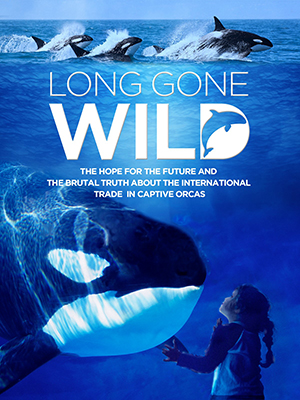Orca Captivity
Long from Gone
By Meghan Rodick
Film producer and animal advocate Rachel Weil has successfully combined two of her passions in her work on “Long Gone Wild,” a feature documentary which unveils the truth behind a persistent global problem - orca captivity. Rachel hopes the film will communicate the ongoing need for action in addition to the changes brought on by the 2013 Blackfish Effect. While SeaWorld agreed to end their orca breeding program in 2016, many people do not know the extent to which orca captivity persists.
“A lot of people believe the orcas are no longer performing,” states Weil. “This couldn’t be further from the truth.”
In addition to putting an end to the breeding program, SeaWorld claimed they would stop orca performances by the end of 2019, which doesn’t seems to be the case since they recently invested millions of dollars into their new “Orca Encounter,” which “may” change the experience for the public, but nothing has changed for the whales. They still continue performing tricks in order to be fed.

Keeping an orca whale in captivity is detrimental to their mental and physical wellbeing – inciting stress, physical injury, and a much shorter lifespan than whales in their natural habitat. They often become lonely and bored. These elements all contribute to the depression of these animals, who have been known to harm themselves and sometimes even commit suicide in captivity.
“Long Gone Wild” also sheds light on an international problem – Russia live capturing orcas and selling them to marine parks in China for multimillion-dollar profits, where orcas ultimately spend the remainder of their lives in captivity.
There is hope for the future however, as the Whale Sanctuary Project will have a location confirmed by the end of this year for retired orcas. The netted off cove will be 100x larger than the tanks they are confined in at marine parks and will feature 24-hour veterinary care. The best part is – they will have the companionship of other orcas in a space which mirrors their natural habitat.
“Our hope is for SeaWorld, and other marine theme parks, to retire these magnificent animals to a seaside sanctuary,” continues Weil. “The concern was always that the orcas could not just be dropped in the ocean, which was a valid point, but now there will be a place for them to go where they will receive round-the-clock veterinary care.”
In addition to the wide distribution in North America on VOD platforms everywhere, including iTunes, Amazon, Google Play and Vudu, the film can also be seen internationally, and purchased online at various retailers.
“It’s important that people stop supporting marine theme parks,” states Weil. “Instead, support groups that work tirelessly on the well-being of these animals, and keeping cetaceans in their natural habitat, like Whale Sanctuary Project and Ric O’ Barry’s Dolphin Project. After all… the ocean IS where they belong.”
For more information visit longgonewild.com.










